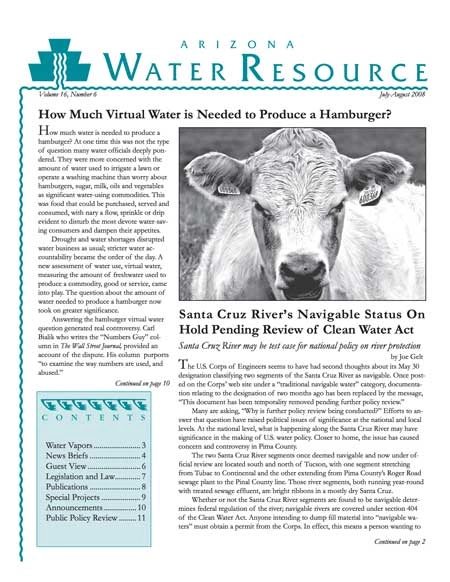
How much water is needed to produce a hamburger? At one time this was not the type of question many water officials deeply pondered. They were more concerned with the amount of water used to irrigate a lawn or operate a washing machine than worry about hamburgers, sugar, milk, oils and vegetables as significant water-using commodities. This was food that could be purchased, served and consumed, with nary a flow, sprinkle or drip evident to disturb the most devote water-saving consumers and dampen their appetites. Now drought and water shortages have created stricter water accountability.
Table of Contents:
Publications & On-Line Resources
- Citizens? Water Planning Views Surveyed
- New Water Journal Calls for Papers
- Watershed Politics Explored
Public Policy Review
- An American in Paris Realizes Arizona Could Do More to Save Water
- Legislation and Law
- EPA Rule: Clean Water Permits Not Needed to Transfer Water
- Court to Decide if Cost-Benefit Can Determine Environmental Protection
Water Vapors
- Looking Into the Water Future: Arizona in 2048
- Arizona and the Colorado River -- Yesterday, Today and Tommorow
Guest View
- ADD Water Invites Input About CAP's Future Water Delivery Role
Special Projects
- Project WET Teachers Attend Conference, Get Classroom Ideas
News Briefs
- Pools of Foreclosed Homes Raise West Nile Fears
- Quagga Mussels Spread in Western Waters
- Floaters Used to Protect Water Quality, Water Supply
- Few Rural Counties Adopt Water-adequacy Rules
- Feds Approve SRP's Habitat Conservation Plan
- Santa Cruz River's Navigable Status On Hold Pending Review of Clean Water Act
- How Much Virtual Water is Needed to Produce a Hamburger?
Announcements
- Rainwater Harvesting Conference
- ADWR Modeling Workshop
- Conference: Climate Change Impact on Southwest
- Potable Reuse Conference
- WRRC Begins Plans For 2009 Conference
AWR Insert: UA Water Researchers Protect and Preserve State Water Resources This AWR supplement is provided by the Water Sustainability Program (WSP)at The University of Arizona. The WSP funds research projects that focus on water quality, water supply, and water education and outreach.

